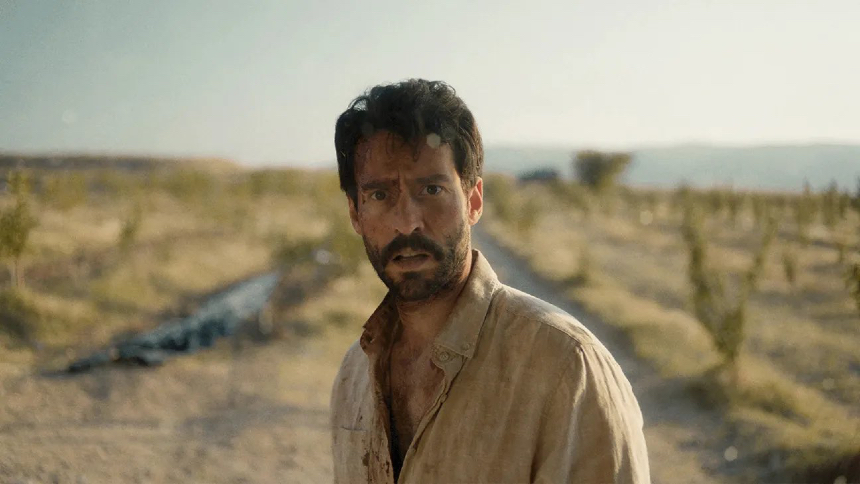Sundance 2025 Review: THE THINGS YOU KILL, A Professor, the Patriarchy, and a Psychological Breakdown

Ali (Ekin Koç), the professor-protagonist in Iranian-born, Canada-residing writer-director Alireza Khatami’s (Terrestrial Verses, Oblivion Verses) perception- and consciousness-bending film, The Things You Kill, suffers from a debilitating existential/spiritual crisis.
After returning to Turkey after more than a decade in the United States to study English literature, Ali discovers that the family life he left behind, specifically a temperamental, authoritarian father, Hamit (Ercan Kesal) and an agitated, distraught mother, hasn’t changed for the better. In fact, it’s gotten far worse as his mother, disabled by age, infirmity, and likely physical abuse, reaches the end of her life on this mortal plane, natural or otherwise.
For Ali, a character who, in Khatami’s multi-layered conception and brilliant execution, literalizes the phrase “we contain multitudes,” an overwhelming sense of guilt, guilt for leaving his family behind for America, guilt for not standing up to his tyrannical family, and guilt for not disclosing his infertility to his veterinarian wife, Hazar (Hazar Ergüçlü), impacts practically every decision he makes. Hemmed in by guilt, anger, and their corollary, shame (one among many, potentially negative aspects of masculinity), Ali evades responsibility with every action he takes or every non-action he doesn’t take. A master of procrastination, he’s practically Shakespearean in his ability to postpone all but the simplest decisions.
At Gazi University in Ankara, Turkey, where Ali teaches English literature in translation, budget cuts set for the following semester threaten to leave him unemployed, adding another element of stress and instability to an already destabilized life. Ali’s refusal to confess his infertility – he receives the news alone in a doctor’s office and promptly hides the information from Hazar – points to a larger problem.
Trapped by the patriarchal norms of contemporary Turkish society, Ali can’t face, let alone accept, a childless future with his wife (and that’s assuming she won’t leave him once she learns the truth about his infertility). In Ali’s world, childlessness equates to another blow to his masculinity, making him less of a man and thus unworthy of his father or his family’s respect.
It's only when Ali’s mother passes away under troubling circumstances and his father, even more cruel, callous, and indifferent than usual, claims he was nowhere near the family home when she died alone that Ali’s conscience begins to stir, compelling him to finally act where he otherwise wouldn’t have. Even then, it takes the unexpected, initially unwelcome arrival of Reza (Erkan Kolçak Köstendil), an itinerant handyman, to the family’s dry, arid property outside of town to spur him into doing something, anything, in response to his mother's seemingly untimely death. Only after accommodating himself to Reza's semi-permanent presence does Ali begin formulating a plan to resolve the crushing, suffocating guilt that drives his actions (or non-action).
As a character, Reza exists primarily as a fictional counterpart or mirror for Ali’s unspoken desires, he might be more – or less – than he appears, an idea Khatami takes to disquieting, Lynchian/Hitchcockian extremes in the second half of the film. It’s the kind of bold, audacious filmmaking decision that threatens to alienate an audience expecting a film guided by real-world rules, not those of fantasy or surrealism. The increasing sense of disorientation, dislocation, and alienation engendered by Ali’s second-half journey, however, more than makes up for any reservations audiences might have initially about Khatami’s narrative- and character-related subversions.
While Khatami’s gifts as a narrative and visual storyteller are never in doubt, he’s equally adept at drawing exactly what he needs from his performers, from Ekin Koç as the frustratingly opaque, quick-to-anger, slow-to-act Ali, to Hazar Ergüçlü as Ali’s relateably sympathetic wife, Hazar. Erkan Kolçak Köstendil especially stands out as the enigmatic, rootless Reza. Reza might be the manifestation of Ali’s deeply disturbed Id, an instrument of superficially righteous retribution, or quite possibly, Ali’s nightmare-laden doom. And therein lies the horror of Ali's existence.
The Things You Kill premiered at the 2025 Sundance Film Festival. Visit the film's page at the official festival site for more information.
The Things You Kill
Director(s)
- Alireza Khatami
Writer(s)
- Alireza Khatami
Cast
- Hazar Ergüçlü
- Ekin Koç
- Erkan Kolçak Köstendil

Do you feel this content is inappropriate or infringes upon your rights? Click here to report it, or see our DMCA policy.






